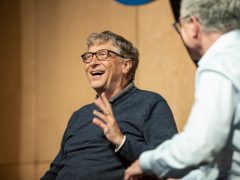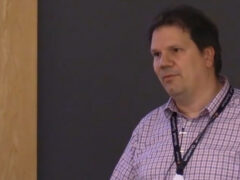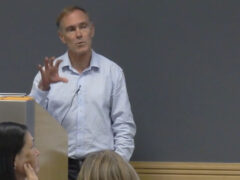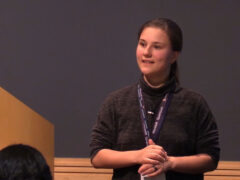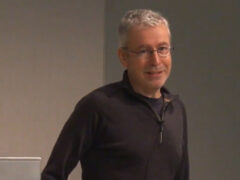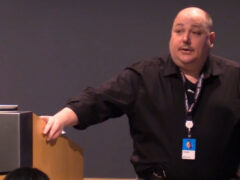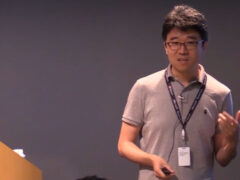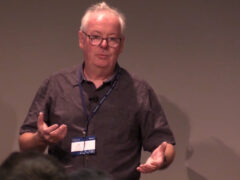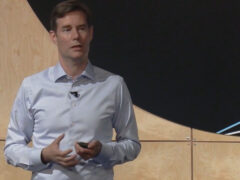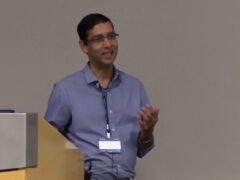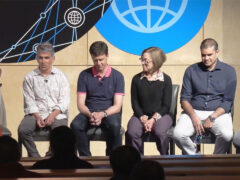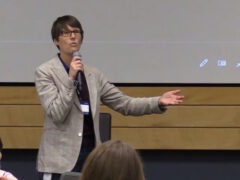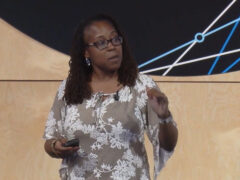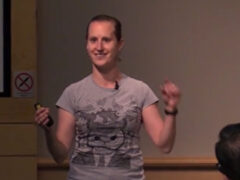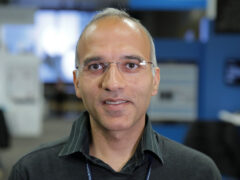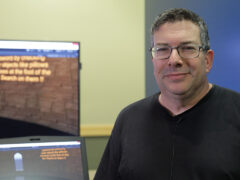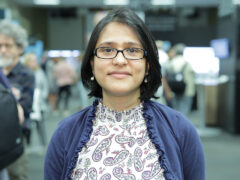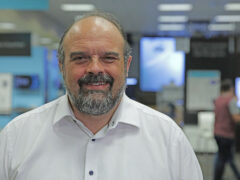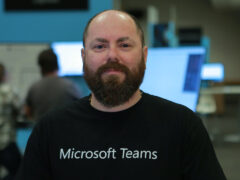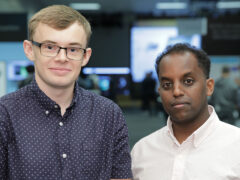Integrative AI: Panel
The panel discusses challenges and opportunities in integrative artificial intelligence (AI), an area concerned with the development of systems that efficiently and robustly integrate multiple AI technologies (e.g., vision, speech, learning, real-time control) and can act and interact in the open world. While over the past years we have seen significant progress on core AI technologies, the science of integrating these competencies into larger systems that are robust, transparent, and maintainable remains very much in its infancy. Numerous research and engineering questions come to the fore: from algorithmic challenges in multimodal representations and modeling, to the science of systems that self-monitor, diagnose their limitations and improve through interaction, all the way to the necessity of research platforms, data, and broader community efforts in this space.
Speaker Bios
Dan Bohus is a Researcher in the Adaptive Systems and Interaction Group at Microsoft Research. The central question that drives his long term research agenda is: how can we develop systems that naturally embed interaction and computation deeply into the flow of everyday tasks, activities, and collaborations? In the last few years Dan’s work has focused on developing computational models for multiparty engagement, turn taking, interaction planning, and on addressing the challenges in inference and decision making that such models bring to the fore. Prior to joining Microsoft, Dan obtained his Ph.D. degree from Carnegie Mellon University, where he investigated problems of dialog management and error handling in speech interfaces.
«Eric Horvitz is serving as the managing director of the Microsoft Research lab at Redmond, balancing lab-wide responsibilities with ongoing research on machine intelligence and on opportunities to leverage the complementarities of human and machine intelligence. Visit his home page.
His ongoing research builds on representations of probability and utility, and centers on identifying ideal actions under uncertainty and bounded informational, computational, and cognitive resources. Beyond curiosity-driven research on foundations of machine perception, learning, and reasoning, he has been excited about building real-world systems that provide value to people, organizations, and society, working in multiple areas, including human-computer interaction, information retrieval, healthcare, transportation, operating systems, and aerospace.
See the Microsoft Research home page as a starting point for browsing through projects, events, and people and contact information for the Microsoft Research lab at Redmond—and other Microsoft labs in the United States and throughout the world. »
Charles Rich is a Professor of Computer Science and a member of the associated faculty of the Interactive Media and Game Development and the Robotics Engineering programs at Worcester Polytechnic Institute. He was previously Distinguished Research Scientist and a founding member of Mitsubishi Electric Research Laboratories. Rich earned his Ph.D. at the MIT Artificial Intelligence Laboratory, where he was a founder and director of the Programmer’s Apprentice project. He is a Fellow and past Councilor of the Association for the Advancement of Artificial Intelligence, a Senior Member of the IEEE, as well as having served as chair of the 1992 International Conference on Principles of Knowledge Representation and Reasoning, co-chair of the 1998 National Conference on Artificial Intelligence, program co-chair of the 2004 and general co-chair of the 2010 International Conference on Intelligent User Interfaces, and program co-chair of the 2011 International Conference on the Foundations of Digital Games.
Lidong Zhou received his M.S. and Ph.D. in Computer Science, both from Cornell University, in 1998 and 2001, respectively. His research interest includes security, fault tolerance, distributed systems and computer networks, and wireless communication.
C. Lawrence Zitnick is a principal researcher in the Interactive Visual Media group at Microsoft Research, and is an affiliate associate professor at the University of Washington. He is interested in a broad range of topics related to visual object recognition, language and artificial intelligence. He developed the PhotoDNA technology used by Microsoft, Facebook, Google, and various law enforcement agencies to combat illegal imagery on the web. Before joining Microsoft Research, he received the PhD degree in robotics from Carnegie Mellon University in 2003.
«Manuela M. Veloso is the Herbert A. Simon University Professor in the Computer Science Department at Carnegie Mellon University. She researches in artificial intelligence and robotics. She founded and directs the coral research laboratory, for the study of autonomous agents that collaborate, observe, reason, act, and learn, www.cs.cmu.edu/~coral.
Professor Veloso is IEEE Fellow, AAAS Fellow, AAAI Fellow, and the past President of AAAI and RoboCup. Professor Veloso and her students have worked with a variety of autonomous robots, including mobile service robots and soccer robots. The CoBot service robots have autonomously navigated for more than 1,000km in our multi-floor office buildings. See www.cs.cmu.edu/~mmv for further information, including publications. «
- Date:
- Haut-parleurs:
- Charles Rich, Dan Bohus, Eric Horvitz, Larry Zitnick, Lidong Zhou, and Manuela Veloso
- Affiliation:
- Microsoft Research, Microsoft, Worcester Polytechnic Institute
-
-

Dan Bohus
Senior Principal Researcher
-

Eric Horvitz
Chief Scientific Officer
-
Jeff Running
-
Larry Zitnick
Principal Researcher
-

Lidong Zhou
Corporate Vice President, Chief Scientist of Microsoft Asia Pacific R&D Group, Managing Director of Microsoft Research Asia
-
-
Taille: Microsoft Research Faculty Summit
-
-
Quantum Computing and Workforce, Curriculum, and Application Development: Case study
Speakers:- Krysta M. Svore,
- Martin Roetteler
-
-
-
-
Crowd, Cloud and the Future of Work: Updates from human AI computation
Speakers:- Besmira Nushi,
- Vani Mandava
-
-
-
-
-
Empowering People to Achieve More: How Useful a Concept is Productivity?
Speakers:- Brendan Murphy
-
-
Productivity in Software Development
Speakers:- Neel Sundaresan,
- Margaret-Anne Storey,
- Prem Kumar Devanbu
-
-
-
-
-
-
-
Accessible Virtual Reality
Speakers:- Eyal Ofek
-
Calendar.help: A Virtual Meeting Scheduling Assistant
Speakers:- Pamela Bhattacharya
-
Visual Studio IntelliCode
Speakers:- Mark Wilson-Thomas
-
Microsoft Teams: Collaborate with Any Researcher Anywhere
Speakers:- Jethro Seghers
-
Project Alava: Programming Webs of Microcontrollers
Speakers:- James Devine,
- Teddy Seyed
-
AI in PowerPoint
Speakers:- Kostas Seleskerov

